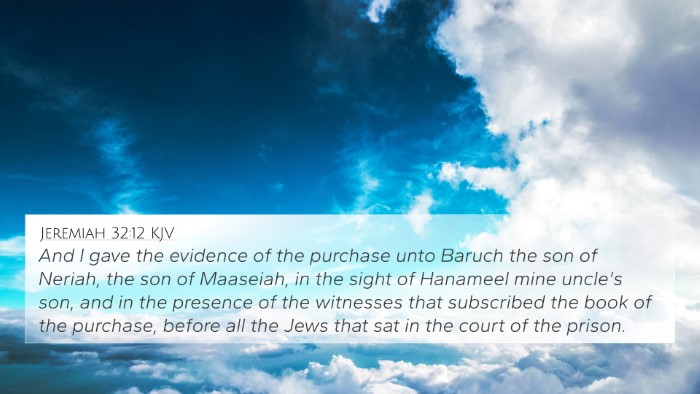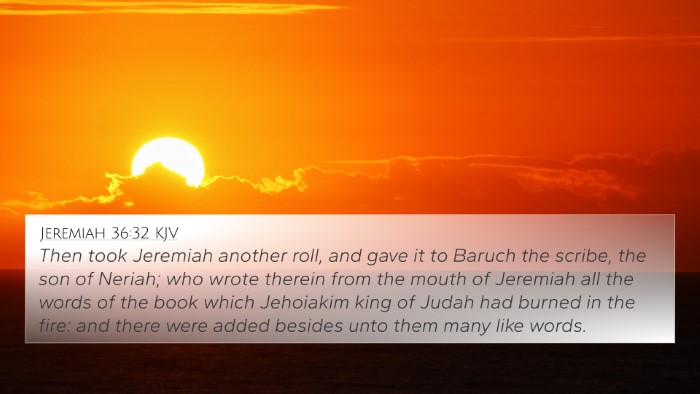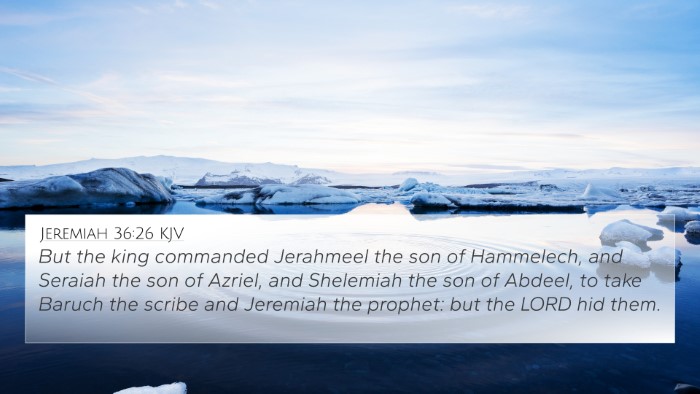Understanding Jeremiah 36:4
Verse Text: "Then Jeremiah called Baruch the son of Neriah: and Baruch wrote from the mouth of Jeremiah all the words of the Lord, which he had spoken unto him, upon a roll of a book." (Jeremiah 36:4)
Summary of Meaning
This verse illustrates a pivotal moment in the ministry of the prophet Jeremiah, emphasizing the collaborative effort in the communication of God’s message to His people. Jeremiah, the prophet, is instructed by God to dictate the words He wishes to convey, and Baruch, his scribe, obediently writes them down. This process not only highlights the importance of accurately recording divine revelation but also sets the stage for the dissemination of these prophecies.
Commentary Insights
-
Matthew Henry:
Henry emphasizes the necessity of faithful servants in delivering God’s messages. He notes Jeremiah's role as a prophet and Baruch's as a scribe reflects a division of labor essential for the effective communication of God's Word. This also symbolizes the importance of written scripture as a means of preserving divine truths for future generations.
-
Albert Barnes:
Barnes points out that the act of Baruch writing down Jeremiah’s words signifies more than just a physical transcription; it represents the accountability of God’s message. By capturing the prophecies in written form, the integrity and authenticity of God’s Word are safeguarded against distortion.
-
Adam Clarke:
Clarke elaborates on the significance of the "roll of a book," noting that this practice was crucial for the preservation and circulation of prophetic writings. He emphasizes that the message must be shared widely so that it may fulfill its purpose of warning and guiding the people of Israel.
Cross-References
This verse connects with several other scripture passages that highlight the themes of prophecy, the role of scribes, and the preservation of God's Word:
- Exodus 34:27 - The commandments written down for Israel.
- Deuteronomy 31:24-26 - Moses commands that the Law be written down.
- Isaiah 30:8 - God instructs Isaiah to write down the vision for future generations.
- Jeremiah 1:9 - God touches Jeremiah's mouth to deliver His words.
- Ezekiel 2:9 - The scroll with lamentations and mourning commanded to be eaten.
- Revelation 1:19 - John is instructed to write what he sees for the churches.
- Luke 1:63 - Zechariah writes down the name of his son, emphasizing the importance of written communication.
Thematic Connections
This verse forms part of a larger narrative involving themes such as:
- The Role of the Prophet: The task of prophets to deliver messages from God and the importance of obedience to divine instruction.
- Communication of God’s Word: How biblical authors and prophets ensured the transmission and preservation of divine revelations.
- The Importance of Written Scripture: The shift from oral tradition to written records as a means to ensure continuity of God’s Word through generations.
Connections Between Bible Verses
Studying Jeremiah 36:4 opens avenues for comparative Bible verse analysis. Here are ways it relates to other key passages:
- Linking with Acts 19:20, where the word of the Lord grows mightily and prevails, indicating a similar theme of authority in the written word.
- Thematic connections with 2 Timothy 3:16-17, which emphasizes the inspiration of scripture and its usefulness for teaching.
- Cross-referencing with Matthew 5:18, where Jesus affirms the permanence and reliability of scripture.
Inter-Biblical Dialogue
Jeremiah 36:4 initiates a dialogue not only within the prophetic literature but also with the New Testament teachings, especially regarding the fulfillment of prophecies. Understanding these connections can deepen one’s study of the Bible and its cohesive narrative.
Tools for Bible Cross-Referencing
Utilizing tools such as Bible concordances and cross-reference guides can greatly enhance the study of passages like Jeremiah 36:4. Consider employing:
- Comprehensive Bible cross-reference materials for additional context.
- Cross-reference systems like topical Bibles for thematic studies.
- Bible reference resources that aid in identifying connections efficiently.
Conclusion
In summary, Jeremiah 36:4 not only illustrates the collaborative relationship between God’s messenger and His message but also highlights the enduring significance of scripture. Engaging with cross-referencing methods can enrich our understanding and solidify the connections across biblical texts, enabling believers to glean profound insights from God’s Word.















